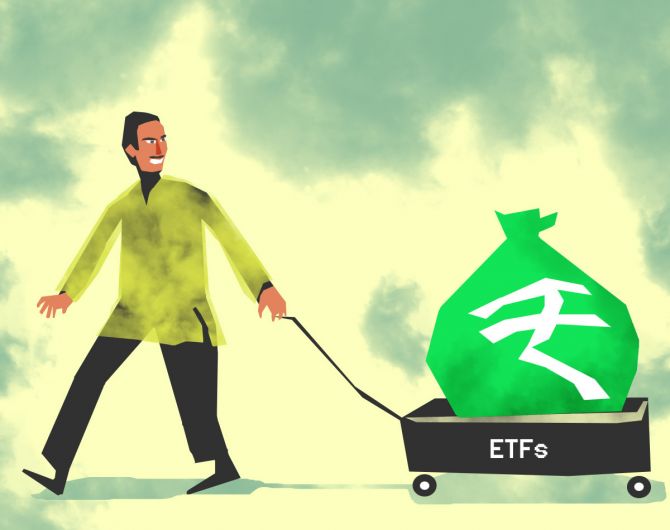Dwaipayan Bose examines the seven important factors that investors in exchange traded funds must know before they start investing/trading in them.

Exchange traded funds or ETFs are passive mutual fund schemes which track an equity or debt market index or the price of a commodity (gold, silver, etc).
Unlike actively traded mutual fund schemes, ETFs do not aim to beat the market index.
ETFs aim to replicate the returns of the market index.
ETFs are listed on stock exchanges and trade like shares of listed companies.
1. Who can invest in ETFs?
You need to have a demat and trading account to invest in ETFs.
If you do not have one, you should contact a stock broker/depository participant and do so.
You will have to fulfil Know Your Client requirements -- submit your identity proof (PAN card/Aadhar card), address proof *Aadhaar card), photographs, etc, and other account opening requirements like a cancelled cheque, duly filled account opening form, etc.
Once your KYC is verified and demat account opened, you can start investing in ETFs through your trading account.
2. How to invest in ETFs
If you are subscribing to an ETF New Fund Offer, you will be allotted units at the offer price of the NFO.
If you are investing in an ETF post listing, you will have to buy at the market price just like how you buy shares of companies.
You should know that the price at which you buy ETF units from the stock exchange may be different from the Net Asset Value of the fund.
If you are purchasing in lot sizes (creation units) as specified in the Scheme Information Document of the fund, you can transact directly with the Asset Management Company at applicable NAVs.
However, you should note that the investment amount required to purchase a creation unit size (lot size) is usually quite large.
For most retail investors, investing in ETFs through their trading account may be the only feasible option.
3. How to redeem/sell your ETF units
You can sell your ETF units in the stock exchange at market price, just like how you sell shares of companies.
You should know that the price at which you sell ETF units from the stock exchange may be different from the NAV of the fund.
If you are selling in lot sizes (creation units) as specified in the SID, you can redeem directly with the AMC at applicable NAVs.
As mentioned before, creation unit sizes are quite large.
Therefore, for most retail investors, the only feasible option of liquidity is through the stock exchanges.
4. What are bid/offer prices?
If you want to buy/sell ETF units through your online trading account, you need to understand bid/offer prices.
The bid price is the maximum price at which a buyer is ready to buy a stock or an ETF. In other words, this is the maximum price at which you can sell your ETF units.
The offer or ask price is the minimum price at which a seller is ready to sell a stock or an ETF; this is the minimum price you will have to pay to buy ETF units.
The offer or ask price will be higher than bid price. The difference between offer or ask price and bid price is known as bid/ask spread.
Bid/ask spread is an indicator of the liquidity of an ETF. The higher the bid/ask spread, the lower is the liquidity.
Liquidity is an important consideration when you are investing in ETFs. You should invest in ETFs which have low bid/ask spread.
Bid/offer prices, along with quantities, will be displayed on your online trading screen. You should see the bid/offer prices before you place your buy/sell order.
5. What is iNAV in ETF?
When you start investing in ETFs, you will come across a term known as iNAV; this means intraday NAV or indicative NAV.
Net Asset Value is the market value of all the securities held in a mutual fund’s schemes or ETF's underlying portfolio less the liabilities divided by the total number of units of the fund outstanding.
Indicative NAV or iNAV indicates the fair value of the ETF. It is an important data point which you must check before buying or selling ETF units at the stock exchange.
As mentioned before, the market price of an ETF may be different from the iNAV.
Indicative NAVs or iNAVs of equity ETFs are updated with maximum 15 second lag by the AMC four times a day; so it is almost real-time from the perspective of retail investors.
6. What are different types of ETFs?
Today, ETFs are available for multiple asset classes like equity, debt, commodities, international stocks, etc.
Equity ETFs track equity market indices (eg Sensex, Nifty, Bank Nifty, etc).
Debt ETFs track debt or money market indices (eg Nifty 5 year G-Sec Index, Nifty 10 year G-Sec Index, target maturity indices, etc).
Commodity ETFs track the domestic price (in rupees) of the underlying commodities (eg gold, silver, etc).
International ETFs track international indices (eg NASDAQ, S&P 500, Hang Seng, etc).
You should invest in ETFs according to your risk appetite.
You should consult with your financial advisor if you need help in understanding your risk appetite and/or the risk profile of your ETF.
7. Taxation of ETFs
There are two types of taxation -- equity and non-equity -- depending on the underlying asset class of the ETF.
Equity ETFs are subject to equity taxation, while debt, commodity and international ETFs are subject to non-equity taxation.
In equity taxation, short term capital gains (investing holding period of less than 12 months) are taxed at 15 per cent (plus applicable surcharge and cess).
Long term capital gains (investing holding period of more than 12 months) are tax exempt up to Rs 1 lakh in a financial year and taxed at 10 per cent (plus applicable surcharge and cess) thereafter.
In non-equity taxation (applicable for debt, commodities and international ETFs), capital gains (irrespective of holding period) are added to the investor’s income and taxed as per the tax slab of the investor.
Disclaimer: This advisory is meant for information purposes only.
This advisory and the information in it does not constitute distribution, an endorsement, an investment advice, an offer to buy or sell or the solicitation of an offer to buy or sell any securities/schemes or any other financial products/investment products mentioned in this article or an attempt to influence the opinion or behaviour of the investors/recipients.
Any use of the information/any investment and investment related decisions of the investors/recipients are at their sole discretion and risk.
Any advice herein is made on a general basis and does not take into account the specific investment objectives of the specific person or group of persons. Opinions expressed herein are subject to change without notice.
Dwaipayan Bose leads content production and mutual fund research at 











 © 2025
© 2025